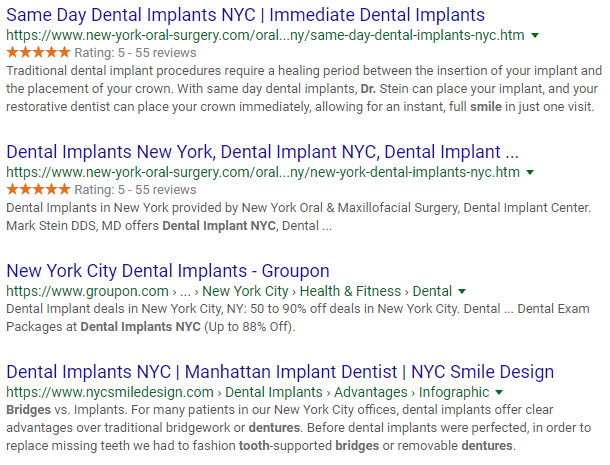What is a Meta Description?
A meta description is a short piece of a text, usually one or two sentences long, that you add to a web page to provide a summary of its contents.
The meta description is not seen by visitors of the web page, however they are used by search engines like Google or Bing as part of the search result snippet provided for your page:

Often, your content management system (such as WordPress, Drupal, etc.) will provide a field where you may add a meta description for your page.
More technically speaking, the meta description is an HTML tag—specifically an attribute of the ‘meta’ element and looks a bit like this in its normal placement.
<head> <meta name="description" content="This is a meta description example. You will find them in search results."> </head>
What is the Best Length for a Meta Description?
Although a meta-descriptions can be any length, the typical search result snippet on Google for a given page is usually between 160 and 320 characters (this figure has undergone recent changes). This means that if your meta description is too long, the snippet may not be able to hold it and so it may be shortened, truncated oddly, or spliced together by Google as needs be. When this happens an ellipse is typically shown to note that some original content is missing.



This has led to the conventional wisdom that meta descriptions should be less than 156-160 characters in length (including spaces). This allows the meta description to be displayed in its entirety without alteration in most cases. What you write is what they see.
What Makes a Great Meta Description?
As a key part of the search result snippet, the meta description can be seen as a little ‘advertisement’ for your web page. It is the copy that the searcher will use to compare search result snippets from competing pages.
I follow three main guidelines when drafting a meta description:
Summarize Well
The meta description should summarize the content of the page. This allows the potential visitor to determine the likelihood that your page contains the information they seek.
Read or reread your page’s content. Determine the main purpose of the page. Determine its key supporting points. What is the most essential message? These elements should be present in the meta description to the extent possible.
You need not repeat the information included in the title of the page unless you think it benefits the summary.

In the above example the brand name, while important, is not repeated in the meta description, however the key feature, finding “restaurants near me,” reappears.
Entice, Convince, Compel
Since the meta-description functions as ad copy in the search results, it’s important to have it entice the reader. This could mean including a call to action in the text or highlighting a key differentiator or unique value offered.
In the following meta description, the practice’s specialty in the care of children is highlighted, as is the rather unique offering of “virtual visits,” and the immediate availability of appointments.

This meta description emphasizes key benefits: enterprise, cost, coverage, flexibility, no lock-in, 24/7 service and immediate availability. Certainly a search listing worthy of consideration if one had an immediate need.

Consider the Competition
Your page’s search snippet (and therefore meta description) will appear in the context of numerous other pages returned for a given search. In this context, those pages are your competitors. You want your listing to stand out from these others. Take a close look at their search snippets and see what Google includes.
Note, that your page may rank for a variety of related keywords. A dentist in New York City may rank for the search phrase “dentist NYC,” for a key service “dental implants NYC,” as well as “emergency dentist NYC.” The competitors’ pages shown in each of these results are likely three very different groups of websites. You should review the results from several relevant searches if possible.

What Not to Do with Your Meta Descriptions
There are also a few actions to avoid when crafting your meta descriptions:
Don’t Leave the Meta Description Blank
When you fail to provide a meta description for your page, the search engine will often attempt to create your search snippet from content found on the page itself. This leads to all forms of problems from incorrect summaries to word salad.
This result was among those returned for the search ‘computer cpus’:

This one for ‘light ballast’:

In general, don’t leave it in another’s hands.
Don’t Overlook Keywords in Your Meta Description
Search engine will commonly highlight a word used in a search if it is found in the search snippet itself. Google will highlight the keyword in the meta description portion of the search snippet, while Bing will highlight it in the snippet’s title and/or URL/address:
Here are two results provided for the search ‘computer cpus’:
Google:

Bing:

The presence of a highlighted keyword in the search snippet tends to draw attention to it, clarify its relevancy and yield a slight increase in click through rate for that result.
Don’t Keyword Stuff Your Meta Description
While the presence of keywords are important, do not simply try to fill the meta description with a stream of relevant keywords. That usually leads to a far less compelling search snippet.
Google has stated as early as 2009 that the content of the meta description does not directly affect the ranking of the page for the keywords used.
So nothing like:
Eye doctor, dry eyes, ophthalmologist, optometrist, glasses, eye exams, tinted lenses, contacts, mail order, same day, astigmatism, glaucoma for you.
Better to connect to the human user, than try to con the algorithm.
Don’t be Repetitive
Don’t be repetitive (see what I did there). Really, just don’t. While using the same meta description for large group of pages or event the entire site is easy, it’s also lazy and doesn’t help clarify the content of that specific page to the searcher. If you don’t have the time or wherewithal, break the task into blocks or hire some professional help.
Avoid Being Vague, Inaccurate or Deceptive
It is important to avoid being vague, inaccurate or potentially deceptive in your meta description. It won’t help your situation if the visitor selects your search result, clicks to your site, only to find out it is not what they expected based on your snippet. They will just immediately leave and return to Google. A tendency toward visitors “pogo sticking” may even adversely impact your page’s ability to rank for that search term as Google prefers to show results that are genuinely useful.
Have a Question?
As usual, please feel free to leave a comment below or contact me if you have a question about your meta descriptions, search engine optimization or anything related.





1 thought on “How to Write a Great Meta Description”
Let readers know what you do, tell them about your unique selling proposition, and convey this information multiple times, because the meta description isn’t a place for subtlety. Struggling to come up with an effective meta description for your home page is common, so it’s best to be patient and think hard about your brand.